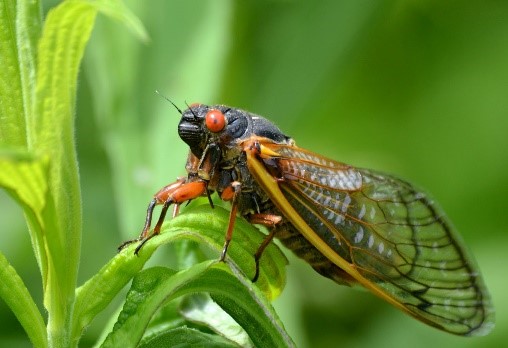The crooners of the insect world will soon grow by the billions in a dozen U.S. states, from New York west to Illinois and south into northern Georgia, including hot spots in Indiana, Ohio, Tennessee, Maryland, Pennsylvania, and yes, New Jersey. Brood X, after 17 years, are expected to surface April/May, depending on soil temps.
Cicadas surface in extremely large masses (1.5 million/acre) to ward off predators. You won’t know they’re around until four to six weeks after they emerge. Then woods and tree-lined neighborhoods will ring with their mating song; the loud buzzing we are all too familiar with help males find their mates. After the cicada mates, each female will lay hundreds of eggs in thin tree branches and then the adult cicadas will die. When the eggs hatch, new cicada nymphs will fall from the trees and burrow back underground to suck sap from tree roots for the next 17 years. Cicadas also sing to warn others of predators and to protect their “space” from other cicadas. But the love song makes me smile more.
Cicadas have many benefits. They prune mature trees, aerate the soil, and once they die, their bodies decay and are an important source of nitrogen for growing trees. When cicadas come out, they’re eaten by many predators, birds, bats, spiders, rodents, other insects (Cicada Killer Wasps), just about anything that eats insects.
These loud insects are harmless and usually cause little damage unless you get too close for too long and then the loud, high decibel sounds they make can cause hearing loss. If they have become a nuisance and are causing too much damage to your ears, plants and/or trees, talk with your Organic Turf Trade representative for solutions.

